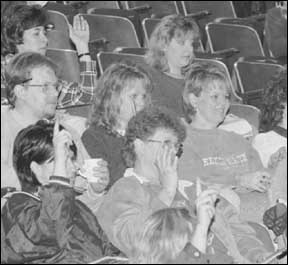 Any parent who has ever felt as if they might be pulling their child's teeth out instead of asking them to take out the trash may have found some helpful tips at the Love and Logic seminar.
Any parent who has ever felt as if they might be pulling their child's teeth out instead of asking them to take out the trash may have found some helpful tips at the Love and Logic seminar.Parents and professionals learned how to use Love and Logic to nurture and discipline kids. Forty adults attended the 90-minute presentation in the elementary school gymnasium on Tuesday, April 18. Peggy Imholte, of Resource: Training and Solutions, and Kelly Dale, of Reach Up Inc., led the seminar.
The first rule of Love and Logic is to set firm limits in loving ways without anger, lecture, or threats. In a video, Jim Fay of the Love and Logic Institute stressed that adults need to take care of themselves first. Without being healthy and strong, parents will have a difficult time supporting and setting limits for their children.
The second rule of Love and Logic is to hold the child accountable for solving their problems. A key tactic in this is using agony instead of anger. Fay demonstrated how anger can seem self-centered while empathy can force a child to take ownership of the problem.
"When kids make mistakes, it's good," Imholte said after the video. "We want them to make as many mistakes as they can when they're young and the consequences are affordable."
Some consequences are very natural, Imholte and Dale said. If your kids miss the school bus, charge them part of their allowance for your mileage and time in driving them to school. As children grow older, sports and activities become natural consequences. Showing concern for a problem but delaying the conse-quence allows parents to think things through. Saying "try not to worry about it" can send the message that the child really has something to worry about.
Imholte also emphasized letting kids make decisions. Allowing choices enables parents to save their authority for the times when it matters most.
Lorrie Gottwald, who has three kids, started to read a book about Love and Logic. She attended the local session to learn more about the program. "I've tried it," she said, "and what I've tried works." It isn't always easy, she added. She said she still wants to improve her patience in times that try her temper.
Jane Ruprecht, who uses the techniques at home and in her second grade classroom, had previously attended a Teaching with Love and Logic seminar. "The more you hear it," she said, "the more you get it."
In avoiding lectures, the program calls for phrases like "No problem" and "That may be so," in pleasant voices. Allow the child to argue. Force them to think. Avoid being on the defensive.
"I guess saying less is saying more," said Ruprecht. It takes a lot of practice, though, she added.
The elementary school had an in-service on Teaching with Love and Logic five years ago. A couple of professionals from the elementary school also attended a workshop on the topic earlier this year. The seminar was supported by donations from all three local financial institutions. The Parental Involvement Committee provided treats.